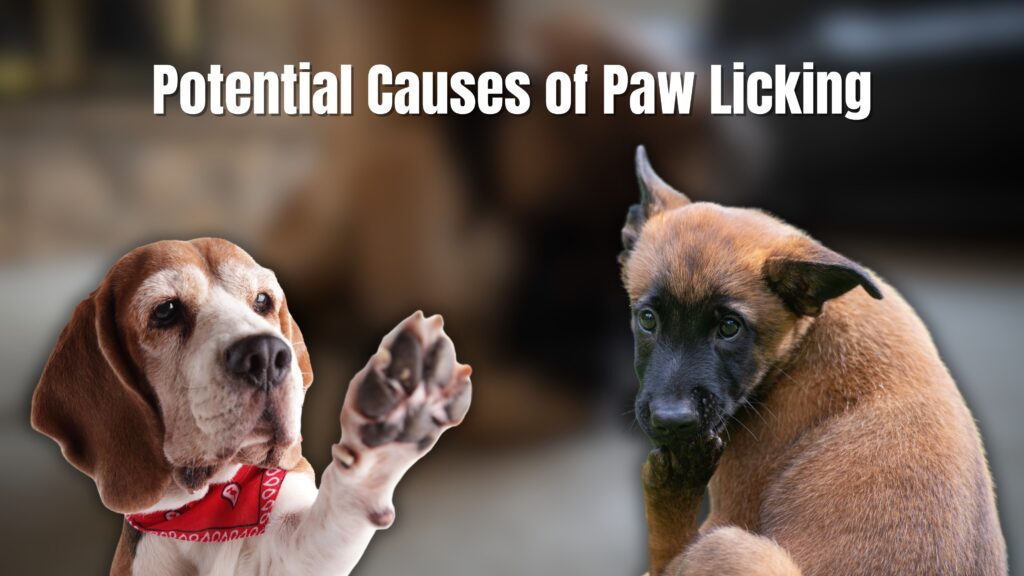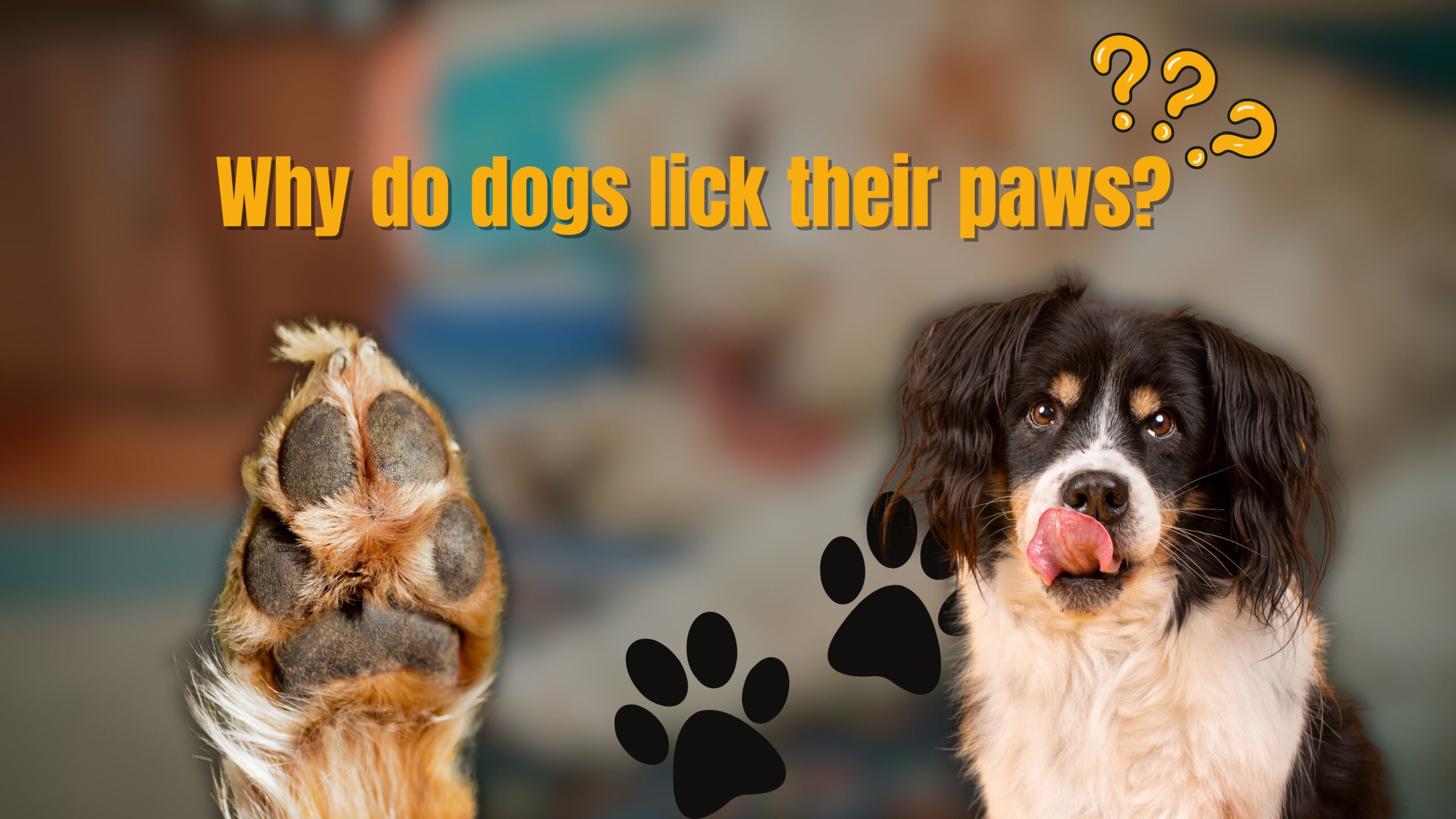Why do dogs lick their paws?
Dogs often lick and chew their paws for various reasons, from simple grooming to more serious issues like allergies, injuries, or infections. Occasional paw licking is generally harmless, especially after walks on dirty or sandy surfaces. Why do dogs lick their paws? However, when this behavior becomes frequent or aggressive, it can indicate a problem. Common causes include environmental allergens like pollen or grasses, food allergies, or parasites. In some cases, foreign objects like splinters or grass seeds might be stuck in the paw, causing irritation or pain.
Infections, such as yeast or bacterial growth between the toes, can also lead to itching and discomfort, prompting the dog to lick excessively. Stress and anxiety may further exacerbate this behavior as a self-soothing mechanism, much like nail-biting in humans. If your dog is persistently licking their paws, it’s essential to investigate potential health issues and consult with a veterinarian to rule out any serious underlying conditions. Early intervention can prevent complications like open sores, known as lick granulomas, that develop from constant licking
5 Reasons Your Dog Is Licking Their Paws
Common Behaviors and When to Worry
Paw licking in dogs is a fairly common behavior that often stems from exploration, self-soothing, or simply cleaning off dirt after walks. While occasional licking is normal, excessive licking—especially if your dog doesn’t stop despite distractions or begins to harm themselves—warrants closer examination. Identifying the underlying cause is crucial for your dog’s health and well-being.

Potential Causes of Paw Licking
1. Injuries or General Pain
Aggressive licking can indicate pain or injury. Signs may include limping, avoiding stairs, or decreased activity. Your dog might be dealing with issues such as stings, cuts, ingrown or broken nails, dry or cracked paw pads, fractures, or burns from hot surfaces or winter chemicals. If you suspect an injury, examine their paws for foreign objects like stones or thorns, and consult your vet for diagnosis and treatment.
2. Fleas and Ticks
Fleas and ticks are prevalent parasites that can lead to intense itching and discomfort, prompting your dog to lick excessively. These pests can thrive in various environments, including bedding and tall grasses. Signs of infestation include small moving bugs or flea dirt on your dog’s skin. Regular checks and preventive medications are crucial, and if you find a tick, ensure you remove it completely to prevent infections.
3. Allergies
Allergies can cause reactions in various areas, including the paws, leading to infections and hot spots. Identifying allergens can be tricky, as they may stem from food, seasonal factors like grass and pollen, or environmental irritants such as household products. Symptoms can include redness, brown stains from constant licking, and secondary infections. A veterinarian can recommend a comprehensive treatment plan, including medications, dietary changes, and topical solutions.
4. Arthritis
Arthritis is common in older dogs and can affect not only large joints but also the toes. It leads to pain and inflammation, making mobility difficult. Management strategies include environmental modifications, dietary adjustments like glucosamine, weight management, low-impact exercise, and anti-inflammatory medications. Veterinary consultation is essential for appropriate pain management.
5. Behavior Issues
Dogs, like humans, can develop behavioral and mental health issues that lead to excessive licking. This behavior might stem from habit, boredom, anxiety, or obsessive-compulsive disorder. Identifying triggers such as separation anxiety or fear of loud noises can help. Increasing physical activity and mental stimulation through puzzle toys and more playtime can alleviate boredom and anxiety.

Working With Your Veterinarian To Treat the Issue
Paw licking is usually not an emergency, but pet owners should be vigilant. If your dog shows signs like bleeding, swelling, limping, or any discharge, consult a veterinarian immediately. Persistent licking can lead to pododermatitis, a painful bacterial infection that complicates treatment if not addressed early. Frequent licking builds moisture, which can worsen infections and discomfort. Early detection allows for simpler solutions and keeps your dog healthier.
To manage excessive paw licking, identifying and treating the underlying cause is crucial. Regularly inspect your dog’s paws for irritations, foreign objects, or infections. Look for symptoms such as redness, swelling, or crusting, and use specialized dog paw cleaners for ongoing care. Rust-colored staining on the fur around the paws indicates frequent licking. Always consult your veterinarian, who can recommend treatments like medicated soaks or antibiotics and refer you to specialists if needed.
Understanding why dogs lick their paws and recognizing when it’s a concern is essential for every pet owner. While occasional licking is normal, constant licking can signal health issues requiring intervention. Early detection through veterinary check-ups and timely treatment can prevent complications. Additionally, providing engaging toys and supplies can keep your dog mentally stimulated and reduce anxiety-related licking, promoting overall well-being.
Home Remedies for Paw Licking
When dealing with irritated or itchy paws in dogs, home remedies can offer relief, but it’s crucial to consult your veterinarian first. For dry or cracked paws, applying coconut oil or a paw balm helps soothe and moisturize the skin. If yeast infections are a concern, soaking the paws in a mixture of water and apple cider vinegar for about 10 minutes can be effective. Additionally, an oatmeal soak—by mixing ground oats with warm water—can alleviate itching and irritation.
Apple Cider Vinegar and Coconut Oil Benefits
Apple cider vinegar is known for its antimicrobial properties and can serve as an excellent remedy for excessive paw licking. A simple soak or a spray made from equal parts vinegar and water can help restore pH balance and deter licking. Coconut oil not only moisturizes but also protects paw pads from irritants and can be given as a dietary supplement to promote skin health from within.
Chamomile Tea for Soothing Relief
Chamomile tea is another gentle remedy that provides anti-inflammatory benefits. Soaking your dog’s paws in cooled chamomile tea can soothe irritation and reduce the urge to lick. Combining these natural treatments with proper veterinary care can help manage your dog’s discomfort effectively.


